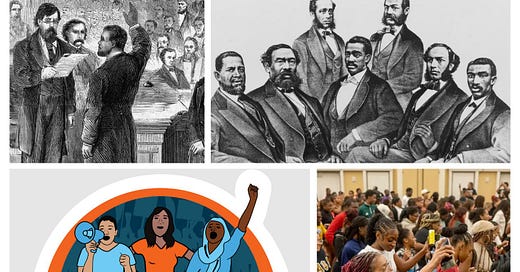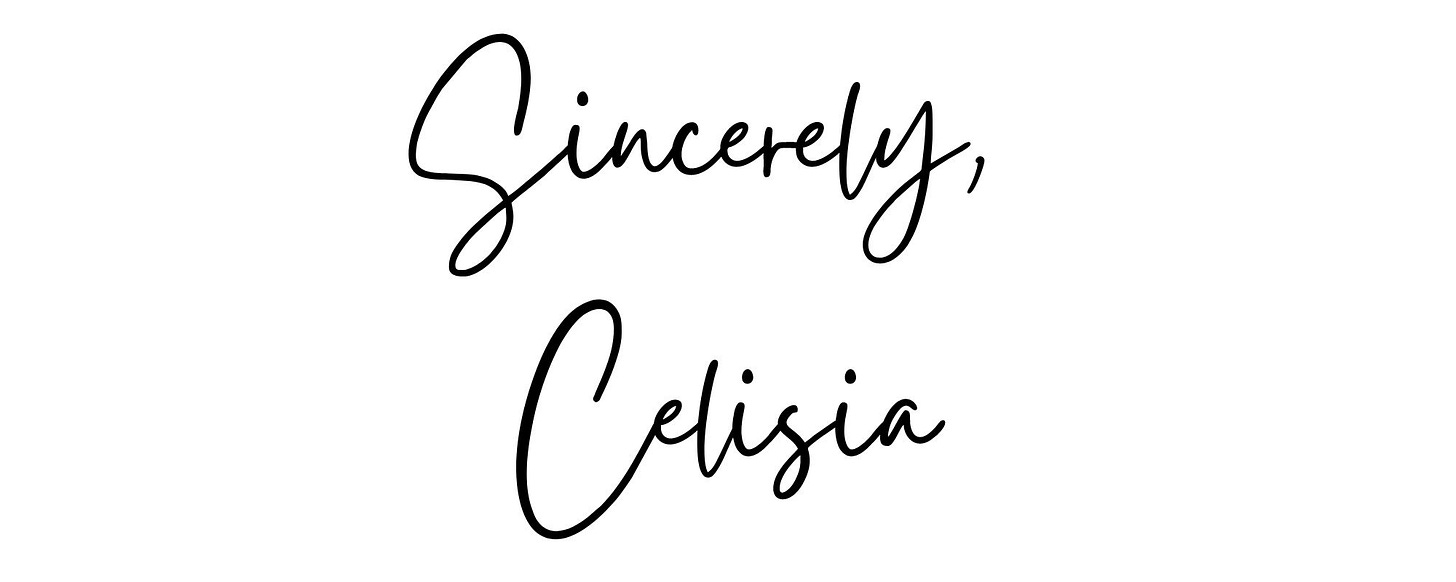Hi friends!
For most of my life, I’ve had the privilege to watch things change (mostly) for the better. It’s something I’ve been thinking about a lot lately, and a few years ago, I probably wouldn’t have framed it so generously. I’m sure that a younger version of myself would have pushed back hard: Things haven’t changed enough! There’s still so much progress to be made! And of course, she had a point. But back then, I think I took progress more for granted than I do now.
I was born in 1995 to gay parents. The first election I remember is George W. Bush’s, and some of my earliest political memories are filled with a vague but passionate hatred of him — an understanding that his policies could hurt families like mine. I kept my mom’s identity a secret from my friends as long as I could, pretending that her partner was actually her sister (a protective tool my mom told me I could use in case I needed it – and I did). My experience isn’t unique. LGBTQ folks have long lived in a hostile world, but I was born at a particular moment. In just under 30 years, I’ve witnessed both extreme homophobia and sweeping national acceptance.
Last June, I reflected on what it’s been like, as the child of a gay parent, to experience this change. I was 20 years old when marriage equality was legalized nationwide. Just a decade prior, I wouldn’t have believed that was possible. By my mid-20s, I was coaching debate students who openly discussed their gender and sexuality in ways I never could have imagined in high school. Homophobia and transphobia still existed, of course, but I couldn’t deny that real progress had happened.
Looking back, my life has been bookmarked by these political moments. I was 9 years old when Massachusetts became the first state to legalize same-sex marriage. I was 13 when Obama became the first Black man elected president of the United States, 15 when he expanded healthcare in a way that would later allow me to stay on my mom’s insurance until I turned 26 (a tangible change that undeniably helped me in my early days as a small business owner). At 16, I watched as thousands of people protested economic inequality and corporate greed as part of Occupy Wall Street. A few months before my 17th birthday, I learned that George Zimmerman murdered Trayvon Martin (a kid my same age), and at 18, I watched the birth of the Black Lives Matter Movement.
All of this happened before I could legally vote. This was the only world I knew. And while I wouldn’t have said it this way at the time, I think a part of me believed progress would always feel this tangible, this inevitable.
But now—watching the cruelty of Trump’s second term unfold—that belief feels naïve. The progress I was used to doesn’t feel guaranteed anymore.
Even when Trump was elected in 2016, resistance felt close behind. He lost the popular vote. His inauguration crowds were thin. And the protests that followed—some of the largest in 50 years (the largest of my lifetime)—made it feel like the country was pushing back.
This second term feels different. He cinched the popular vote and won the electoral college by a larger margin than Joe Biden did in 2020. Public support for Trump is no longer fringe. Dozens of celebrities who’d remained quiet during his first inauguration publicly attended his second. This isn’t the kind of backlash I grew up watching— it feels deeper, more organized, harder to fight.
And because this moment feels so new to me, I started looking back. I wanted to zoom out from my own lifetime and ask: When has this happened before? What does conservative backlash look like historically? When have bursts of progress been followed by years of regression? What can those moments teach us?
And to be honest, when I went looking for examples, I depressed my own damn self. I started reading about Reconstruction, a span of 12 years immediately following the end of the Civil War. From 1865 to 1877, the progress was truly enormous.
In 1865, the 13th Amendment abolished slavery, and the very next year, Congress passed the Civil Rights Act, declaring that all people born in the U.S. were citizens with inalienable rights. In 1867, Congress passed the Reconstruction Act, laying the foundation for interracial democracy in the South and leading to the ratification of the 14th and 15th Amendments, which granted equal protection and voting rights (for men) regardless of race.
By 1870 — just five years after the Civil War ended — Black men were holding political office. Hiram Rhodes Revels became the first Black member of the U.S. Senate and Joseph Rainey entered the House of Representatives. In total, sixteen Black men served in Congress between 1870 and 1880, some of whom had been enslaved just years earlier.
It was radical. It was hopeful. And it didn’t last.
White supremacist groups like the KKK quickly mobilized, using violence and fear to push back against the changes. In 1874, Democrats gained control of the House for the first time since the war. A year later, they launched a violent campaign to retake Mississippi, and President Grant refused to intervene.
By 1876, Republicans held just three Southern states. That year, a contested presidential election led to the Compromise of 1876. In exchange for certification of his win, Republican Rutherford B. Hayes agreed to hand the South back to the Democrats. Reconstruction was over.
And just like that, everything started to unravel.
White supremacist groups like the White League and Red Shirts began targeting Black voters. Jim Crow laws, poll taxes, and voter suppression tactics spread across the South. The last Black Congressman from the South, George White, left office in 1901. After that, it would take 72 years before another would be elected. Not until the Civil Rights Movement of the ‘60s would we see another period of such rapid progressive movement and policy change.
So yeah. It’s depressing. And for a moment, I wondered—have I already lived through most of the progress I will see in my lifetime? Will we have to wait another century for change?
But then I took a step back. Yes, the progress of Reconstruction was important, and so was that of the Civil Rights Movement. But is it really fair to say that nothing changed in the years between them?? Of course not.
As segregation gained control in the South, a new political protest movement took root. In 1909, activists seeking a permanent civil rights organization to fight against lynchings and further the rights of Black Americans came together and founded the National Association for the Advancement of Colored People (NAACP). By 1921, the NAACP had more than 400 locations. In big and small ways, people pushed back, eventually leading to more considerable changes in the 50’s, from the integration of public schools to the Montgomery Bus Boycott.
It’s also worth considering that while Black civil rights were a central target of the conservative backlash during the first half of the 21st century, other progressive movements were still able to gain meaningful traction. The women’s suffrage movement resulted in the passing of the 19th Amendment, winning women (including Black women, although they continued to face voter intimidation and disenfranchisement) the right to vote. The labor movement also made considerable strides, including winning the right for private sector employees to unionize, strike, and participate in collective bargaining with the passage of the National Labor Relations Act in 1935.
It all made me wonder, what if we stopped treating these periods of rapid progress less like once-in-a-lifetime flukes, and more like finish lines? Moments that became possible only because people kept pushing day after day, year after year.
If we think of progress that way, then backlash isn’t a glitch in the system—it’s a feature. A sign that change is happening. Because progress isn’t linear, it’s cumulative. It builds. And every win matters.
The reality is, I don’t know how long this era of conservative backlash will last. I don’t know when (or if) we’ll ever truly root out Trumpism. Honestly, it might not happen within our lifetime, though I hope it will. But I’m not saying this to be fatalistic. I’m saying this to shift us towards hope. Because the truth is rapid progress will happen again. It might be next year. It might be long after we’re gone. But when it comes, it will not be from nowhere. It will be because we committed today, and tomorrow, and the next day, and the next day, and the next day—not just for ourselves but for a future that is accepting, safe, compassionate, and supportive for everyone coming up behind us. We stand on the shoulders of all those who, steadfastly, remained committed to the long arc of history. As Mariame Kaba tells us, ‘hope is a discipline,’ and we owe it to the next generation to hone that skill. If people kept fighting through slavery, through Jim Crow, through decades without a glimmer of federal progress, we can, too. Because even and especially when progress slows down, we need to keep it pushing.
Action items to support and care for the world around us.
Because today’s intro is a bit longer than usual, I decided to skip the Computer Room section so we can jump right into some actions to help us keep it pushing!
The Trans Youth Equality Foundation (TYEF) offers a range of resources for transgender, nonbinary, and gender non-conforming children and youth and their families, including an emergency fund for trans youth in crisis or those fleeing anti-trans states. TYEF is also hosting a summer camp for youth ages 8-17 during the weekend of August 1st. You can access an application for camp by emailing contact@transyouthequality.org, or donate to support their work here.
If we want to combat MAGA ideology across the country, we need strong, progressive candidates to run at all levels of public office. Run for Something recruits and supports young progressives looking to do just that. You can learn more about how to run for office, support progressive candidates currently running, or donate to support their work here.
As immigrants are under attack, United We Dream is consistent in advocating for their rights and dignity. On their website, you can access mental health resources, stay updated on changes to the Deferred Action for Childhood Arrivals (DACA) program, register for their mailing list, and donate to support their work.
As state and federal legislation cuts funding to programs related to diversity, equity, and inclusion, Ohio University has fallen in line. Historically, the University has hosted Kushinda/Ritos de Pasaje, formerly known as Black Graduation or Black Baccalaureate, a graduation tradition for multicultural students honoring their unique experiences. But this year, students are stepping up to host the event themselves. You can donate to support their efforts here.
Things to try + share in the group chat.
Note: Links preceded by an asterisk (*) are affiliate links that allow me to collect a small commission when you purchase something I’ve recommended. That said, I can promise I’ll only ever share items I love. Buying through these links is one way to support me and my small biz. ❤️
Jordan Peele’s Us is a horror movie that still sends chills down my spine, and this creepy dance is the perfect celebration of the film!!
I recently got *this 100% Merino wool cat bed for my boys, and they’ve become big fans of their new hidey-hole. I got the bed in size medium, which is still on the smaller side, but my fat cats still fit in there just fine. There are a number of colors to choose from, but I opted for the simple light grey, and it looks great in my space. <3
Always on the hunt for easy weekday meals, I’m excited to try this 20-minute Spicy Peanut Garlic Oil Noodles by @halfbakedharvest.
Last week, I invited audio producer extraordinaire Sidney Evans to share some of his top nostalgia-related recommendations. Check it out!
Have a great weekend!
Want to stay connected between now and next Friday? Don’t be a stranger!! Make sure to follow me on Instagram and TikTok. Know someone who you think would like Sincerely, Celisia? It would mean the world if you could help spread the word by sharing this newsletter through the button below!! <3







